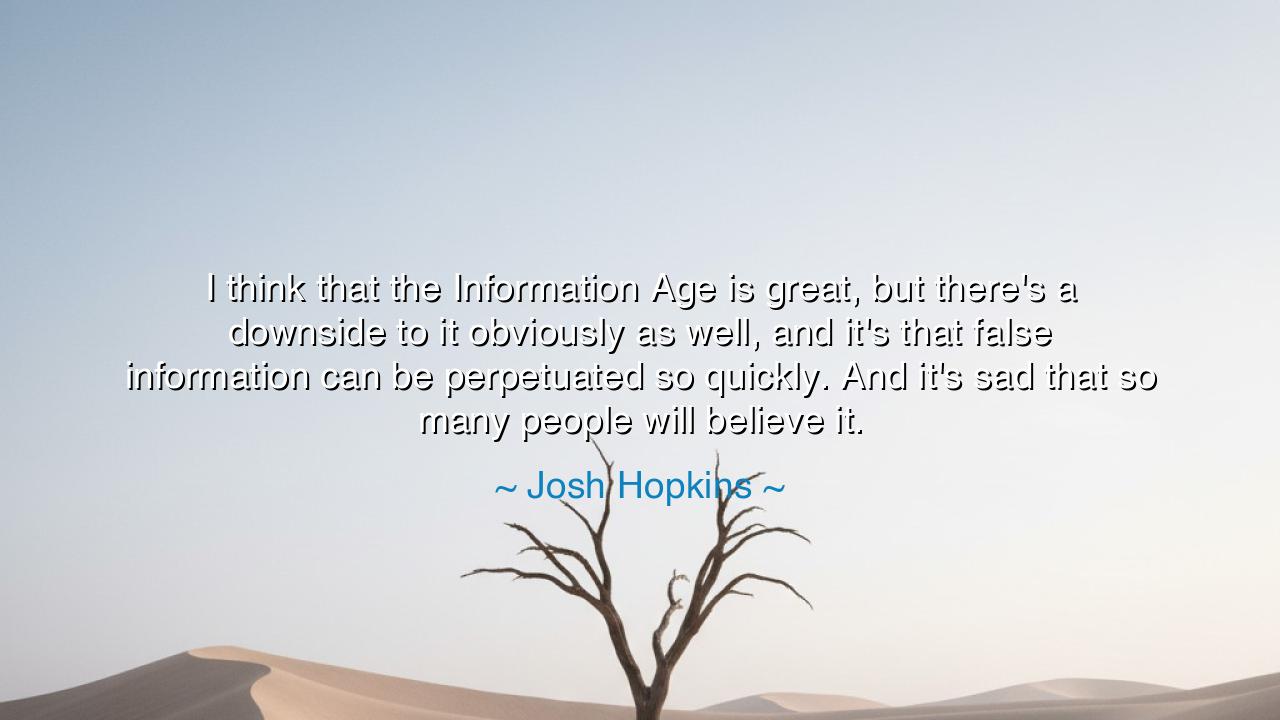
I think that the Information Age is great, but there's a downside
I think that the Information Age is great, but there's a downside to it obviously as well, and it's that false information can be perpetuated so quickly. And it's sad that so many people will believe it.






Josh Hopkins once reflected on the world he lived in and said: “I think that the Information Age is great, but there's a downside to it obviously as well, and it's that false information can be perpetuated so quickly. And it's sad that so many people will believe it.” His words, though born of our modern age, carry the tone of an ancient lament—a recognition that progress, when untempered by wisdom, can become its own peril. The Information Age, he acknowledges, is a marvel of connection and knowledge, yet it has also opened the floodgates of illusion. What once took years to spread can now circle the globe in a moment, and what once demanded evidence now thrives on speed and spectacle.
In the old world, wisdom was guarded by time. A story passed through many mouths before it became truth, and lies could not run faster than a horse. But now, the spark of misinformation leaps from screen to screen like wildfire across dry grass. Hopkins’ sadness lies in the credulity of the masses, in the ease with which a falsehood, clothed in the garments of familiarity, becomes accepted as fact. He mourns not technology itself, but the fragility of discernment—the human mind’s growing hunger for immediacy over reflection, for affirmation over understanding.
The ancients would have seen this as a battle not of tools, but of the soul. For as long as humans have spoken, there have been false prophets, deceivers, and flatterers who preyed upon the unguarded heart. The philosopher Plato warned of the danger of sophists—those who wielded rhetoric not to uncover truth but to manipulate perception. Hopkins’ “false information” is the modern sophist, now multiplied by algorithms and given the reach of lightning. It whispers not in the marketplace, but in every home, every pocket. And because it flatters what we already believe, it finds no resistance.
History offers many mirrors to this moment. In the days of ancient Rome, rumors spread through the Forum could topple leaders and ignite chaos. One such tale—of Nero’s supposed heroism during the Great Fire—was propaganda, crafted to mask tyranny with illusion. The crowd, desperate for reassurance, believed it. So too today, many cling to falsehoods not from malice, but from longing—for simplicity, for certainty, for belonging. Hopkins’ lament, then, is both a moral and emotional truth: the tragedy of belief misplaced is that it robs the believer of the freedom to think.
Yet, his words are not only warning—they are also a call to mindfulness. The Information Age, he reminds us, is not doomed by its inventions but by our use of them. Just as fire can warm or destroy, knowledge too can enlighten or corrupt. To live wisely in this era is to practice discernment—to pause before sharing, to question before judging, to seek not what feels true, but what is true. In this way, each person becomes a guardian of truth in a world where truth itself trembles.
There is also compassion in his statement, for Hopkins does not mock those who believe; he pities them. His sadness reveals empathy—for the countless hearts deceived, for the minds too weary to sift through the endless noise. He sees that ignorance in the age of information is not born of stupidity, but of exhaustion. In a world where data rains endlessly, clarity becomes the rarest of treasures. To find it requires stillness, humility, and courage—the very virtues the ancients cherished above all others.
So let this reflection be a guide for future generations: use knowledge with reverence, not recklessness. Verify before you trust; think before you echo. For every falsehood believed, a truth is buried deeper, and for every careless word shared, the world grows a little dimmer. But when truth is sought and cherished, when understanding triumphs over haste, then the Information Age can fulfill its promise—not as an age of noise, but as an age of awakening. Let each of us, then, be a light of discernment in the dark sea of deception, remembering that wisdom has never been about knowing much, but about knowing well.






AAdministratorAdministrator
Welcome, honored guests. Please leave a comment, we will respond soon